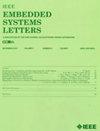Pythia: An Edge-First Agent for State Prediction in High-Dimensional Environments
IF 1.7
4区 计算机科学
Q3 COMPUTER SCIENCE, HARDWARE & ARCHITECTURE
引用次数: 0
Abstract
Modern deep learning agents usually operate in low-dimensional environments. They process pixel input, do not offer insights into their thought process, and require significant power and computational resources. These characteristics make them inapplicable for embedded devices. In this letter, we present Pythia, an edge-first framework that uses latent imagination to handle complex environments efficiently and envision future agent states. It utilizes a vector quantized variational autoencoder to reduce the high-dimensional features into a low-dimensional space, making it ideal for modern embedded devices. Moreover, Pythia offers human interpretable feedback and scales well with respect to the design space. Pythia surpassed the other state-of-the-art models in prediction accuracy on both intrinsic and extrinsic metrics.Pythia:用于高维环境中状态预测的边缘优先代理
现代深度学习智能体通常在低维环境中运行。它们处理像素输入,不提供对其思维过程的洞察,并且需要大量的功率和计算资源。这些特性使得它们不适用于嵌入式设备。在这封信中,我们介绍了Pythia,一个边缘优先的框架,它使用潜在的想象力来有效地处理复杂的环境,并设想未来的代理状态。它利用矢量量化变分自编码器将高维特征减少到低维空间,使其成为现代嵌入式设备的理想选择。此外,Pythia提供了人类可解释的反馈,并且在设计空间方面具有良好的扩展性。皮媞亚在内在和外在指标上的预测准确性超过了其他最先进的模型。
本文章由计算机程序翻译,如有差异,请以英文原文为准。
求助全文
约1分钟内获得全文
求助全文
来源期刊

IEEE Embedded Systems Letters
Engineering-Control and Systems Engineering
CiteScore
3.30
自引率
0.00%
发文量
65
期刊介绍:
The IEEE Embedded Systems Letters (ESL), provides a forum for rapid dissemination of latest technical advances in embedded systems and related areas in embedded software. The emphasis is on models, methods, and tools that ensure secure, correct, efficient and robust design of embedded systems and their applications.
 求助内容:
求助内容: 应助结果提醒方式:
应助结果提醒方式:


